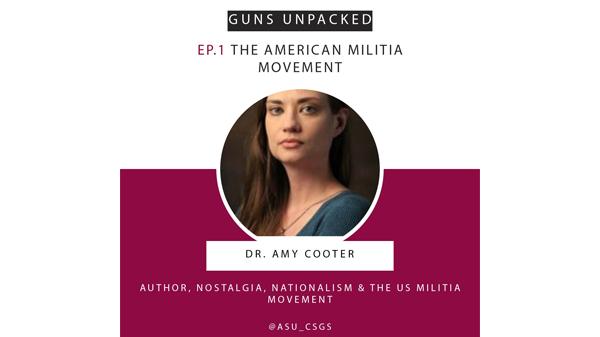Launching August 30th: Guns Unpacked with Dr. Amy Cooter on the American Militia Movement

On August 30th, join Guns Unpacked in conversation with Dr. Amy Cooter as we discuss the American Militia movement, what it means to research it, and how her background growing up in rural Tennessee has shaped how she approaches her research.
Our conversation starts with how social scientists often begin: with definitions. Dr. Cooter reminds us that deciding what counts as a “militia” is often a difficult task. She defines militias as armed civilian paramilitary groups that are distinguished by their emphasis on regular firearms training and safety. Part of the draw for members is the nostalgic connection that militias provide, which she describes as
"Having positive feelings of the past, even though the past, as people imagine it, may not have truly existed that way."
In her book Nostalgia, Nationalism and the US Militia Movement, she lays the context of the modern militia movement groups within the gun politics of the mid-1990s and differentiates two main strands: constitutional and millenarian. Constitutional militias focus on camaraderie, firearms training, survival skills, and view themselves as protecting against potential government overreach, a defensive posture. They operate openly and see themselves as upholding the Constitution. Millenarian militias have a more conspiratorial, angry, and violent orientation. They actively seek to initiate violence against the government and its representatives. They tend to be more secretive and fit the stereotypical view of armed militia groups looking to harm others.
"There's a fundamental difference between somebody who joins a group because they're worried about the government or because they're worried about their gun rights, versus they join another group because they hate people who aren't white."
The conversation also turns to how the militia movement fits into the proliferation of conspiracy theories, particularly through social media, in the post-2016 context and this environment creates difficulties with regarding to state responses to militia activities. Looking ahead, Dr. Cooter believes more militia and militia-like groups will emerge, particularly among minorities and those on the political Left, given the current social and political climate. Acknowledging the improbability of a gun-free country, she supports policies focused on enhanced safety measures.
You can listen to Guns Unpacked on RSS, Spotify, Apple Podcasts and YouTube.